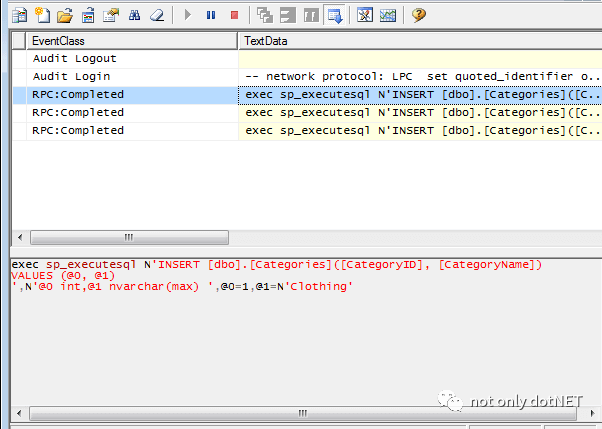EFCore批量操作,你真的清楚吗
背景
EntityFramework Core有许多新的特性,其中一个重要特性便是批量操作。批量操作意味着不需要为每次Insert/Update/Delete操作发送单独的命令,而是在一次SQL请求中发送批量组合指令。
EFCore批量操作实践
批处理是期待已久的功能,社区多次提出要求。现在EFCore支持开箱即用确实很棒,可以提高应用程序的性能和速度。
1
对比实践
以常见的批量插入为例,使用SQL Server Profiler观察产生并执行的SQL语句。
// category表添加3条记录并执行保存
using (var c= new SampleDBContext())
{
c.Categories.Add(new Category() { CategoryID = 1, CategoryName = "Clothing" });
c.Categories.Add(new Category() { CategoryID = 2, CategoryName = "Footwear" });
c.Categories.Add(new Category() { CategoryID = 3, CategoryName = "Accessories" });
c.SaveChanges();
}
当执行SaveChanges(), 从SQL Profiler追溯到的SQL:
exec sp_executesql N'SET NOCOUNT ON;INSERT INTO [Categories] ([CategoryID], [CategoryName])
VALUES (@p0, @p1),(@p2, @p3),(@p4, @p5);',N'@p0 int,@p1 nvarchar(4000),@p2 int,@p3 nvarchar(4000),@p4 int,@p5 nvarchar(4000)',
@p0=1,@p1=N'Clothing',@p2=2,@p3=N'Footwear',@p4=3,@p5=N'Accessories'
如你所见,批量插入没有产生3个独立的语句,而是被组合为一个传参存储过程脚本(用列值作为参数);如果使用EF6执行相同的代码,则在SQL Server Profiler中将看到3个独立的插入语句 。下面是EFCore、EF6批量插入的对比截图:
① 就性能和速度而言,EFCore批量插入更具优势
② 若数据库是针对云部署,EF6运行这些查询,还将产生额外的流量成本
经过验证:EFCore批量更新、批量删除功能,EFCore均发出了使用sp_executesql存储过程+批量参数构建的SQL脚本。
2
深入分析
起关键作用的存储过程sp_executesql:可以多次执行的语句或批处理 (可带参)
- Syntax for SQL Server, Azure SQL Database, Azure SQL Data Warehouse, Parallel Data Warehouse
sp_executesql [ @stmt = ] statement
[
{ , [ @params = ] N'@parameter_name data_type [ OUT | OUTPUT ][ ,...n ]' }
{ , [ @param1 = ] 'value1' [ ,...n ] }
]
注意官方限制:
The amount of data that can be passed by using this method is limited by the number of parameters allowed. SQL Server procedures can have, at most, 2100 parameters. Server-side logic is required to assemble these individual values into a table variable or a temporary table for processing. // SQL存储过程最多可使用2100个参数
3
豁然开朗
SqlServer sp_executesql存储过程最多支持2100个批量操作形成的列值参数,所以遇到很大数量的批量操作,EFCore SqlProvider会帮我们将批量操作分块传输,这也是我们在实际大批量使用时看到分块发送的原因。
EFCore开放了【配置关系型数据库批量操作大小】:
protected override void OnConfiguring(DbContextOptionsBuilder optionbuilder)
{
string sConnString = @"Server=localhost;Database=EFSampleDB;Trusted_Connection=true;";
optionbuilder.UseSqlServer(sConnString , b => b.MaxBatchSize(1));
// 批量操作的SQL语句数量,也可设定为1禁用批量插入
}
总结
① EFCore 相比EF6,已经支持批量操作,能有效提高应用程序的性能
② EFCore的批量操作能力,由对应的DataBaseProvider支撑(Provider实现过程跟背后的存储载体密切相关);关注SQL存储过程sp_executesql,官方明文显示批量操作的列值参数最多2100个,这个关键因素决定了在大批量操作的时候 依旧会被分块传输。
③ 另外一个批量操作的方法,这里也点一下:构造Rawsql 【EFCore也支持Rawsql】
sqlite不支持存储过程,为批量插入提高性能,可采用此方案:
var insertStr = new StringBuilder();
insertStr.AppendLine("insert into ProfileUsageCounters (profileid,datetime,quota,usage,natureusage) values");
var txt = insertStr.AppendLine(string.Join(',', usgaeEntities.ToList().Select(x =>
{
return $"({x.ProfileId},{x.DateTime},{x.Quota},{x.Usage},{x.NatureUsage})";
}).ToArray()));
await _context.Database.ExecuteSqlCommandAsync(txt.ToString());
+ https://github.com/aspnet/EntityFrameworkCore/issues/6604
+ https://docs.microsoft.com/en-us/dotnet/framework/data/adonet/sql/table-valued-parameters?redirectedfrom=MSDN



